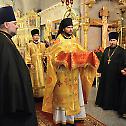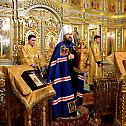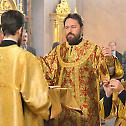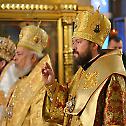Science
Weekly Diocesan Bulletin - Sunday, December 25, 2016
25. December 2016 - 15:41 Twenty-seventh Sunday after Pentecost; Second Sunday before Nativity: Holy Forefathers of the Old Covenant; Saint Spyridon the Wonderworker, Bishop of Tremithus; Serbian Mother’s Day
Twenty-seventh Sunday after Pentecost; Second Sunday before Nativity: Holy Forefathers of the Old Covenant; Saint Spyridon the Wonderworker, Bishop of Tremithus; Serbian Mother’s Day
RESURRECTIONAL TROPARION - TONE TWO:
When Thou didst descend to death, O Life Immortal, Thou didst slay hell with the splendor of Thy Godhead! And when from the depths Thou didst raise the dead, all the powers of heaven cried out: O Giver of Life! Christ our God! Glory to Thee!
Metropolitan Hilarion celebrates at Moscow representation of Orthodox Church of Czech Lands and Slovakia
20. December 2016 - 15:04On December 19, 2016, the commemoration day of St. Nicholas the Wonderworker and Archbishop of Myra in Lycia, Metropolitan Hilarion of Volokolamsk, head of the Moscow Patriarchate department for external church relations (DECR), celebrated the Divine Liturgy at the St. Nicholas Church-in-Kotelniki – the Moscow representation of the Orthodox Church of the Czech Lands and Slovakia, which marked on that day its 17th anniversary.
Modernity and Orthodoxy
9. December 2016 - 9:21Bishop Jovan (Puric)
The modern world functions as a single planetary market on which everything is sold and bought: from physical territories, possessions and objects, to virtual “electronic money” and stock market shares, to identity and sovereignty, memory, soul, even past and future! The principle of a market economy emerged as universally valid, possessing not only economic principles but also for comprehensive human life. The overall life of humanity, and every individual human being, in all timezones, depends on the impersonal and ruthless laws and mechanisms of market economics, the aggressive dynamics of supply and demand, production and consumption, input and output. The spirit of this modern consumer civilisation, “the civilization of turning a human being into a thing”, is the spirit of greed and lust, “insatiable hunger for things and possessing them”.
Actually, one of the basic features of modern civilisation, “the fuel” of its progress and development, is that artificial “development” of that insatiable hunger in people, or more precisely the passion for possessing and spending, a hunger which cannot be satisfied by either possessing or spending since, as we know from the Tradition of the ascetic Fathers of the Church, passion may not be “satisfied”; the more it is practised, the more it is developed and permeating the man, subordinating him, reducing his freedom, sucking out his life energy, narrowing the horizon of his godlike personality, numbing its bodily and spiritual senses, passivising the mental powers of his soul, disturbing the psychological and psychical balance of his personality, causing physical and mental diseases, until it brings the man to complete spiritual and life ruin, and even physical death.
St. Alexander Nevsky, Russia’s Knight in Shining Armor
7. December 2016 - 11:29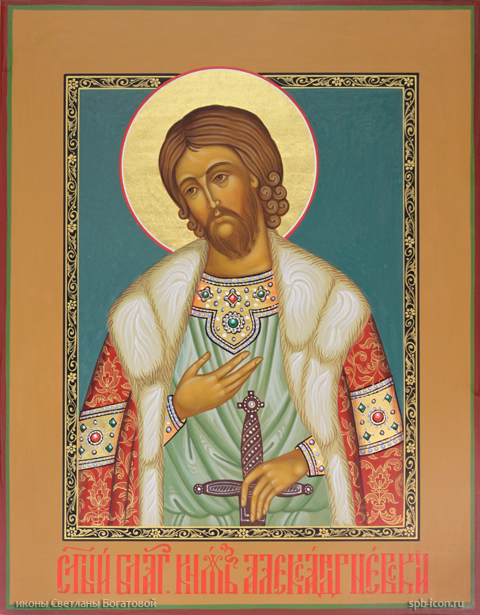 Commemorated November 23/December 6 and August 30/September 12
Commemorated November 23/December 6 and August 30/September 12
St. Alexander Nevsky was Russia’s “knight in shining armor.” His reputation as a man of exceptional valor and surpassing virtue inspired a visit by a German commander who told his people when he returned: “I went through many countries and saw many people, but I have never met such a king among kings, nor such a prince among princes.” The Russians called him their “prince without sin.”
He was born just four years before the fierce Tatars, under the leadership of Ghengis Khan, came galloping across the steppes of Kievan Rus. The once flourishing city state—whose social, cultural and spiritual achievements boasted few rivals in Western Europe—had been weakened by quarrelling princes and attacks of warring tribes, and it was an easy prey for the massacring and pillaging Asiatic aggressors. Fortunately, the Mongol Horde’s primary interest in conquest was financial gain, and although it imposed a heavy tax on its subjects, they were left to govern themselves and retained their traditions and religion intact, Nevertheless, the yoke of foreign sovereignty was burdensome; individual princes were reduced to acting as feudal landlords for their Mongol lords, and inclinations toward s national unity—the dream of Grand Prince Vladimir—were stifled. A strong leader was needed if the land of Rus’ was to have any hope of healing internal strife, of throwing off the Tatar yoke, and establishing its identity as a nation state.
The Church's engagement with the world - Witnessing as the Church's method
2. December 2016 - 16:05BISHOP JOVAN (PURIC)
The complex, polymorphous and fluid problematics of the (“post-Christian”) present have presented the Church – the universal Body of Christ and us Christians, godlike personalities that are the reason-bearing limbs of that Body, with an unprecedented challenge[1] in the history of Christianity thus far, one that we cannot, even if we should wish to, ignore, overlook or suppress. As an answer to this dramatic challenge, we must offer a living and creative Christian answer – a personal-universal witnessing of the present Church generation, an answer articulated on the basis of the Church’s universal traditional experience and a personal experience of faith as our active inclusion in that universal experience, if we wish to fulfill Christ’s commandment – to be the salt of the earth and the light of the world (Mt 5:13, 14), to truly be Christians. Here we should immediately point out that the said word of Christ is not simply some spiritual or moral “suggestion” or “counsel” that may be situationally accepted or rejected by one’s own free will, but an explicit Divine commandment concerning an active witnessing of theandric salt and the light of Christ to all people and nations, and to all of creation, which God personally commands as a necessary precondition for us to be Christians at all, and to call ourselves Christian. The entire history of the Church, which is, in fact, nothing other than the history of its world – a world that she transformed, through Christ’s salt and light, into the Christian world, bears witness to the fact that there are no “Christians outside of the world,” nor is there a “world outside of the Church.” For, a theoretical concept and practice of Christianity by which, in abhorrance of the “sinful world,” Christians isolate themselves into some sort of self-satisfied and righteous “holy remnant” and “island of the saved,” is neither evangelical, nor ecclesiastical, nor Orthodox but, rather, “all too human,” “religious,” psychologizing, pietistic and utopian,[2] and, as such, foreign to the entire Living Tradition of Christ’s Orthodox Church. Precisely due to the fact that this Tradition, through the entire theology of the Fathers, has forever rejected any dualistic understanding of man and the world as being in opposition to the truth of the man of God and the world of God, along with any “religious” dualism, i.e., the introduction of dichotomous schisms and divisions[3] into God’s single creation (and, before all, divisions into “sacred and profane,” “spiritual and material,” “religious and secular,” with the first element of these dichotomous pairs being assigned to the sphere of “salvation,” and the second not only being forejudged as lost for being unclean and ephemeral, but also being consciously “left” to this fate).
Weekly Diocesan Bulletin - Sunday, November 27, 2016
24. November 2016 - 10:26 Twenty-third Sunday after Pentecost:
Twenty-third Sunday after Pentecost:
The Holy and All-praised Apostle Phillip;
Saint Gregory Palamas; Holy Emperor Justinian
RESURRECTIONAL TROPARION - TONE SIX: The angelic powers were at Thy tomb; and the guards became as dead men; and Mary stood by Thy grave, seeking Thy most pure Body. Thou didst capture hell, not being tempted by it. Thou didst come to the Virgin, granting life. O Lord who didst rise from the dead: Glory to You!

